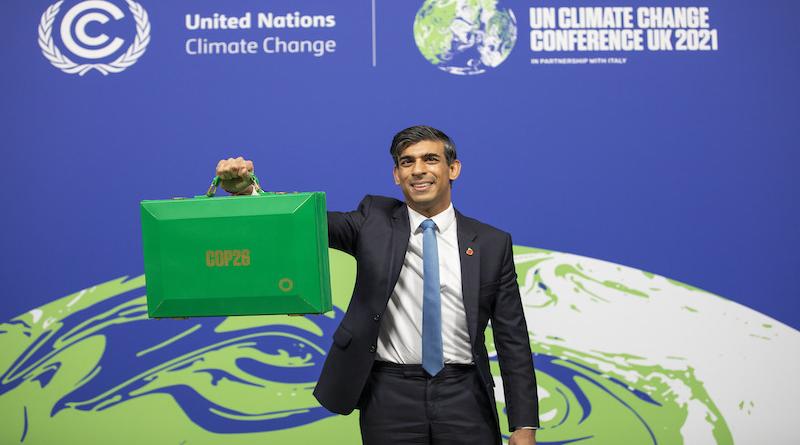Developing nations decry risk of UK breaking climate finance pledge

The United Kingdom’s reported plan to break its flagship international climate finance pledge is “disappointing” and undermines trust, climate negotiators from developing countries told Climate Home News.
The commitment to provide £11.6 billion ($14.7bn) between 2021 and 2026 was first made by former prime minister Boris Johnson in 2019. It was repeated again by prime minister Rishi Sunak at Cop27, where he said it was “morally right to honour our promises”.
But, according to an internal government document seen by The Guardian, the UK has constantly underspent and would now find it a “huge challenge” to respect that pledge.
A government spokesperson refuted the claims, saying the UK is still committed to the pledge and delivering on it.
They said the UK spent £1.4 billion on international climate finance over the course of the 2021-22 financial year. This is less than the average £2.32 billion a year which would need to be provided up to 2026 in order to respect the pledge.
‘Sad’ climb down
A source within the African Group of Negotiators told Climate Home News “the news is disappointing, especially since the UK, while Cop26 president, took up a very promising leadership role and breathed hope and trust in the process”. They added that “to climb down from the pledge is unfortunate and sad, especially for developing countries bearing the brunt of the climate crisis”.
The sentiment was echoed by Madeleine Diouf Sarr, chair of the Least Developed Nations group, who said climate finance “must be scaled up, not back”, highlighting rich countries’ ongoing failure to provide $100 billion a year in climate finance by 2020. Originally made in 2009, that pledge has not yet been respected.
https://twitter.com/LDCChairUNFCCC/status/1676573542903676929
“[Our people] need support more than ever to address its escalating impacts,” Diouf Sarr added in a tweet. “Global solidarity and cooperation remain critical for tackling climate change”.
Aid cuts
Former prime minister Boris Johnson vowed in 2019 to double the amount of international climate finance destined for projects to cut emissions in developing countries and help them adapt to the effects of climate change. The UK spent £5.8 billion on the programme in the five years up to 2021.
But, since the pledge was made, the UK cut aid spending to 0.5% of GDP, down from 0.7%. Some climate initiatives immediately felt the impact of the budget cuts. A programme protecting poor communities around the world from floods and fires had its budget slashed by 70%. At the time, its lead in Nairobi, Joanes Atela, warned this would “directly harm the life chances of the most vulnerable”.
In order to meet the £11.6 billion pledge, government officials have calculated that it would have to spend 83% of the total overseas aid budget on the international climate fund and “squeeze out room for other commitments”, the Guardian reported.
Another government document reported on by the British newspaper suggests underspending is set to continue. A civil servant from the department in charge of the programme wrote in a note that spending for 2022-23 was £1.3 billion and initial analysis of business plans put the figure for 2023-24 at £1.58 billion. This is below the trajectory set by the government, according to the report.
The publication of the documents’ content follows the resignation last Friday of Zac Goldsmith, a foreign office minister, over what he described as prime minister Rishi Sunak’s “apathy” towards climate change.
Broken trust
Bolivia’s Diego Pacheco, who represents the Like-Minded Developing Country coalition, told Climate Home News the news “will continue undermining the trust in the UNFCCC process”. He also claimed this is “part of the same behavior not aligned with the respect of the Convention and its Paris Agreement”, pointing to disappointment with the UK’s role in securing a Glasgow Climate Pact he described as “without equity”.
The looming threat of a broken pledge is likely to sow further divisions between developed and developing nations at a time when tension is already running high at climate talks.
In Bonn last month negotiations teetered on the brink as the two camps fought for nine days over the inclusion of emissions reduction measures and climate finance in the agenda. In the end, they reached a compromise rescuing the talks but leaving many disappointed.
Future implications
A row back on the previous pledges could also stoke fears over rich nations’ future commitments under current considerations. Countries are discussing how the loss and damage fund, secured at Cop27 last year, should be filled. A future climate finance pledge, building on the $100 billion a year one, is also being talked about.
Laetitia Pettinotti, an economist at Overseas Development Institute (ODI), says the UK’s breaking its promise would have “really stark implications” as it sends the wrong signals to the ongoing negotiations. “The UK is already among the laggards in climate finance,” she added, “this would be the final straw after years of distrust”.
The UK has so far only provided 55% of its “fair share” under a calculation done by the ODI that includes the size of its economy and historical emissions.






